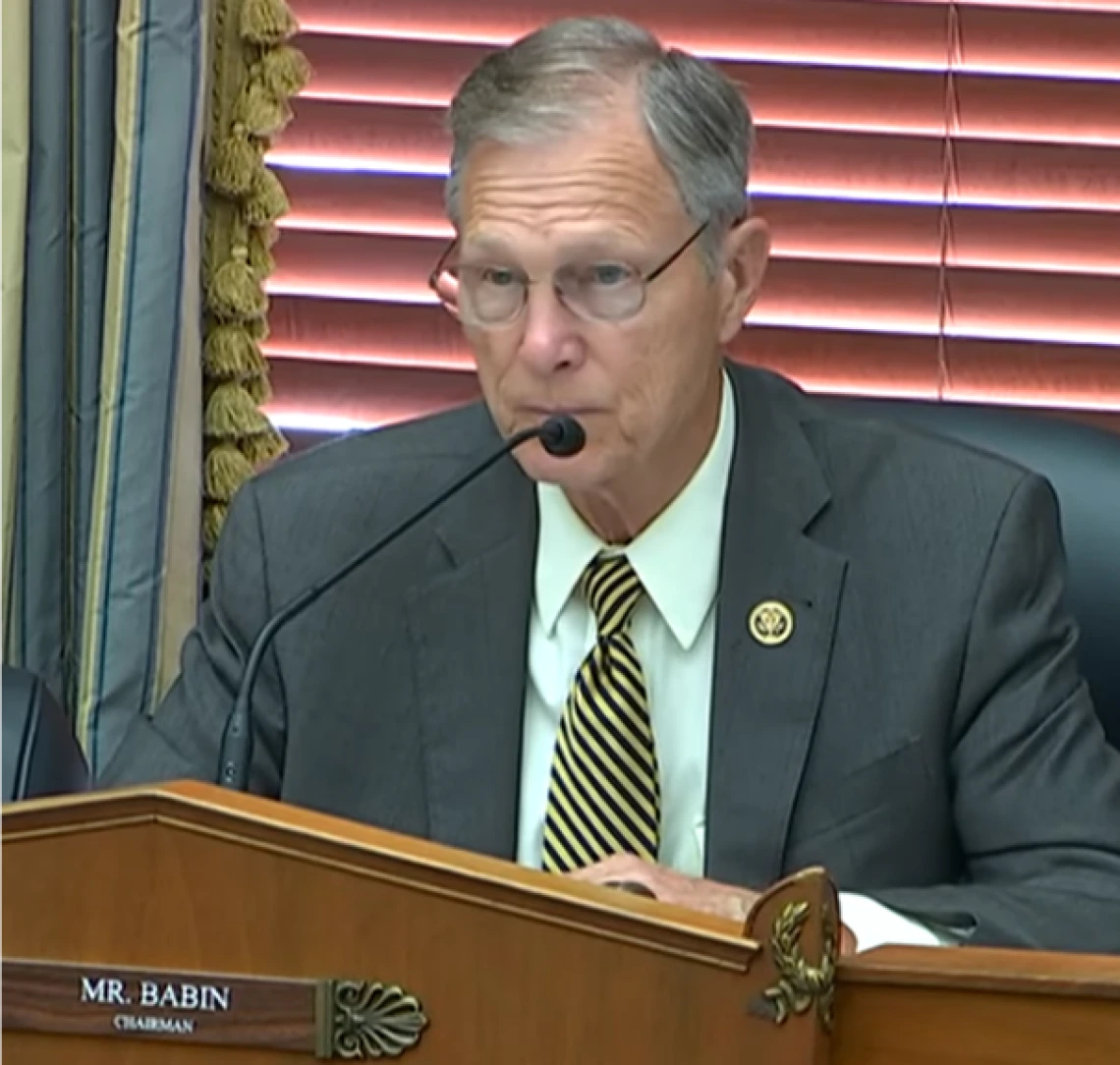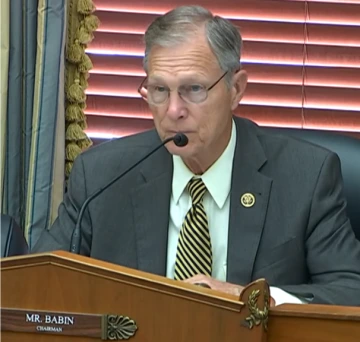Babin’s Top Priorities: Vibrant Commercial Space Sector, Americans Back on Moon

Rep. Brian Babin (R-TX) at a hearing on commercial space launch regulation, September 10, 2024. Screengrab.
Rep. Brian Babin, chair of the House committee that oversees NASA and the commercial space sector, said this week that maintaining a “vibrant, prosperous commercial space sector” will be a top priority for the committee. That includes asking the Government Accountability Office to review whether the FAA’s Part 450 regulations actually are making licensing more efficient and effective as intended. Another top priority is getting Americans back on the Moon before China gets there.
A long-time member of the House Science, Space, and Technology Committee and chair of the space subcommittee, Babin (R-TX) was chosen to chair the full committee in January. His district includes Johnson Space Center.
In remarks to the Commercial Space Conference (CSC) on February 12, Babin announced that he and the top Democrat on the committee, Rep. Zoe Lofgren (D-CA), were about to send a letter to the Government Accountability Office (GAO) asking them to look into how the FAA’s Office of Commercial Space Transportation is implementing the Part 450 regulations.
Written during the first Trump Administration in response to Space Policy Directive-2 to modernize and streamline regulations for commercial space launches and reentries, many companies are finding them difficult to navigate. Applications for new licenses already must follow Part 450. Existing licenses were temporarily grandfathered into the previous regulations, but they must transition to Part 450 by March 2026.
Following a fiery hearing last September, Babin and Lofgren are asking whether the regulations really are doing what they were intended to do.

Rep. Brian Babin (R-TX) at a hearing on commercial space launch regulation, September 10, 2024. Screengrab.
“Although the new regulations were crafted with the best of intentions and on a compressed timeline, they are not without their challenges,” Babin told the commercial space representatives attending the CSC. GAO’s review will give Congress an “objective look at existing procedures and offer insight into whether further improvements are needed through legislation or administrative action.” The February 12 letter asks six detailed questions. No timeline is set for GAO to report back.
Babin also said the committee will continue work on commercial space legislation that will determine what agency or agencies have “mission authorization” authority over novel space activities. Babin’s bill in the last Congress cleared committee on a party-line vote in November 2023 after the Biden-Harris White House submitted their own draft legislation less than an hour before the committee’s markup was to begin. The Biden-Harris bill was completely different from Babin’s. Bipartisan skepticism about the White House proposal emerged at a Senate hearing the next month. No further action occurred on either side of Capitol Hill.
Babin told the CSC it doesn’t have to be complicated. He wants to put the Department of Commerce in charge of mission authorization for space activities that are not already regulated by other agencies, not split it up as the Biden-Harris National Space Council proposed.
“If the United States seeks to be the ‘forum of choice’ for space operators, it is critical that we facilitate space commerce by establishing an appropriate framework for commercial space operators when working with the federal government.” — Rep. Brian Babin
Babin also plans to work on space situational awareness, finding a way to leverage “the expertise of the private sector rather than standing up a duplicative and redundant government capability.”
As important as commercial space is, Babin’s “top priority” is getting American astronauts back on the Moon before the Chinese Communist Party (CCP) gets there. President Trump’s embrace of the humans-to-Mars goal in his inaugural address and his close association with Mars enthusiast Elon Musk has raised concerns that NASA might skip the Moon and focus on Mars, but Babin made clear the Moon as a first step is critical.
“We are in a race back to the Moon. As I said before, my top priority is ensuring U.S. astronauts return to the lunar surface and that we do so before the CCP.
“By returning to the Moon and maintaining a human presence, America will have a key role in establishing standards of openness and freedom in operations that will guide deep space exploration for years to come.
“We will use the Moon as a proving ground, allowing us to develop and test technologies needed for future deep space missions, including our ultimate goal of landing humans on Mars. We do not do this alone; we will return to the Moon with commercial and international partners.” — Rep. Brian Babin
Avoiding unnecessary regulations is key to that, too. The “ingenuity” of the U.S. private sector is an advantage, but “if that private sector is tethered to Earth by red tape, I fear that when U.S. astronauts return to the Moon they will find a ‘No Trespassing’ sign written in Mandarin.”
He expressed optimism that, working with Lofgren, a new NASA authorization bill will be signed into law providing “urgently needed direction from Congress.”
Getting a new NASA authorization bill passed was also a bipartisan priority for the committee last year, as it was for the bipartisan leadership of their Senate counterpart, the Senate Commerce, Science, and Transportation Committee. But it didn’t happen. The House passed a bill, but the Senate introduced their version only in the closing days of the Congress, too late for action. Bills that don’t pass by the end of a Congress die and the process must begin anew.
Rep. Mike Haridopolos (R-FL), the new chair of the space subcommittee, also spoke at the conference. Representing Kennedy Space Center, he is in complete agreement on the need to go back to the Moon before heading off to Mars.
